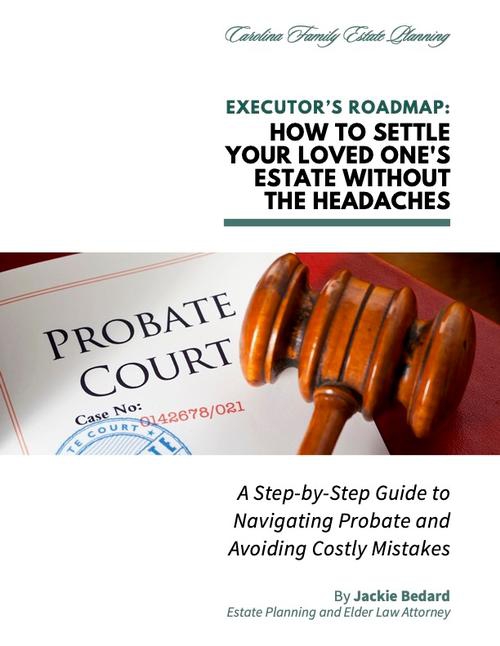Navigating probate in North Carolina can be a daunting task, especially when you're grieving the loss of a loved one. However, having a clear understanding of the essential documents needed can make the process smoother and less overwhelming. Whether you're named as an executor in a will or are handling an estate without one, here’s a guide to ensure you’re fully prepared.
Essential Documents for Probate Court in North Carolina
When filing for probate, here are the primary documents you’ll need to bring to the Clerk of Court’s office:
1. The Will
The cornerstone of any probate process is the decedent’s Last Will and Testament, if it exists. This document outlines how the deceased wished their assets to be distributed and names the executor responsible for managing the estate. If the original will cannot be found, a copy may suffice in some situations, but it could require additional steps, like affidavits or a court petition.
-
Where to Locate It: Wills are often stored in safes, safety deposit boxes, or with the decedent’s attorney. Sometimes, a will may have been deposited with the Clerk of Court for safekeeping.
2. Certified Death Certificate
A certified death certificate provides formal proof of the decedent’s passing, which is crucial for initiating probate and other administrative tasks.
-
How to Obtain It: Certified copies can be requested from the North Carolina Vital Records Office or the Register of Deeds in the county where the death occurred.
3. Preliminary Inventory of the Decedent’s Property
This document lists the decedent’s property, including real estate, financial accounts, and personal belongings, along with their approximate value. It serves as the foundation for determining the estate’s worth and handling distributions.
-
Tip: Include details like account numbers, property addresses, and descriptions of valuable items.
4. Application for Letters Testamentary or Letters of Administration
This form is a request for legal authority to act as the estate’s personal representative. If the decedent left a will, the executor applies for Letters Testamentary. If no will exists, the court grants Letters of Administration to an eligible individual (often a family member).
-
Where to Find the Form: Available at the Clerk of Court’s office or downloadable from the North Carolina Courts website.
5. Filing Fee
As of 2025, the probate filing fee in North Carolina is $120. Payment can usually be made via cash, check, or an accepted electronic method.
Steps to Begin the Probate Process
-
Contact the Clerk of Court
-
Reach out to the Clerk of Court in the county where the decedent resided. Some offices accept walk-ins, while others require appointments.
-
-
Gather Required Documents
-
Bring the will, certified death certificate, preliminary inventory, and application forms to your appointment.
-
-
Submit Forms and Pay the Fee
-
File the necessary documents with the Clerk of Court and pay the filing fee. You’ll receive instructions for obtaining Letters Testamentary or Letters of Administration.
-
Additional Documents That May Be Needed for Probate Court
Checklist of Key Probate Documents
Certified Death Certificate: Required for proof of death and to proceed with estate administration.
Last Will and Testament: If a Will exists, it must be submitted to the Clerk of Court for validation.
Application for Letters Testamentary or Letters of Administration: Necessary to request legal authority as the estate’s executor or administrator.
Preliminary Inventory of the Decedent’s Assets: Lists all known assets, such as real estate, bank accounts, and personal property.
Additional Documents That May Be Required
Depending on the estate’s complexity, the following documents might also be required:
Beneficiary Designations: For payable-on-death accounts, life insurance policies, or retirement accounts.
Deeds and Titles: Proof of ownership for real estate and vehicles.
Financial Statements: Bank and investment account records.
Life Insurance Policies: Documentation of beneficiaries and payout details.
Debt Statements: A list of outstanding debts to settle before distributing assets.
Medical and Funeral Expenses: Invoices and receipts for costs incurred.
Trust Documents: If a revocable living trust exists, provide its terms and listed assets.
Tax Returns: Federal and state tax filings for the last three years may be needed..
Business Agreements: Contracts related to the decedent’s business interests.
Loan Agreements: Details on outstanding loans or debts owed by the decedent.
Appraisal Reports for Valuable Assets: Documentation for items like jewelry, art, or collectibles to establish their worth.
When to Seek Help with Probate in North Carolina?
Probate can be time-intensive and emotionally taxing. Working with an experienced estate administration attorney ensures you navigate the legal system efficiently while protecting the estate’s value. Attorneys can help:
-
Guide you through document preparation.
-
Provide legal representation during disputes.
-
Minimize errors that could delay proceedings.
At Carolina Family Estate Planning, our Estate Administration team specializes in helping North Carolina families manage probate with confidence and care. Contact us today to schedule a case assessment and start the process on the right foot.
If you’re feeling overwhelmed by the probate process, you don’t have to go through it alone. Call us at 919-4433035 or click here to schedule your complimentary Case Assessment today.


